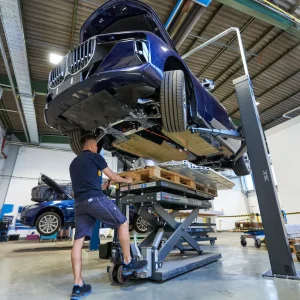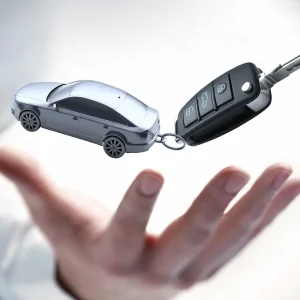German brand Porsche is instigating moves to make itself more attractive to the leasing market and fleet operators as its product line-up continues to grow in business car appeal.
Having appointed a pre-owned and corporate sales manager in the form of Jonathan Maynard at the beginning of this year – the first time a Porsche GB employee has had the word corporate in their job title – the firm has been opening itself up to the fleet sector through increased information flow and openness.
“The product is the prime driver – we’re not trying to get into fleet as in setting sales and volume targets,” Maynard tells BusinessCar. “We’re not about to embark on a big new sales strategy – it will be very much a Porsche approach.”
The company is at huge pains to point out that it won’t be pushing volume into the sector or setting fleet targets, but has made a number of moves designed to make itself easier to deal with, having previously shied away from even accepting it operated in the sector at all.
Maynard took up his role in early 2013, having joined the firm from Peugeot in January 2004.
“Maybe there is a perception that we have been a bit arrogant in the past, but we want to break down that boundary,” continues Maynard, who feels that the activities of other perceived premium brands in moving into the mainstream could present an opening for Porsche.
“There is an opportunity coming for us – quality premium brands are becoming more ubiquitous and leaving behind some space as they push volumes out and lose a bit of discipline,” he declares. “We are still in that zone. We’re not about to lose our shape or discipline by getting into this marketplace.”
Although Porsche is loath to talk specific numbers, the firm registered around 8000 new cars last year, should just shade that this year, and isn’t looking for a huge volume growth from any increased fleet business.
The big move has been to finally open up to leasing companies with information flow. Recent moves include publishing SMR data to fleet influencers for the first time ever last month, a move coming just weeks after the brand took on SMR specialist Epyx’s 1link system to speed authorisation of maintenance and repair.
Other changes the sports car manufacturer has implemented include a specific business area on its website with Porsche Contract Hire pricing examples for each model, improved data provision to the residual value experts, and it claims to have engaged with the top 25 leasing companies at the Porsche Experience Centre at Silverstone over the past two years.
The SMR data is a crucial move because Maynard admits leasing companies were taking a “step into the dark when quoting on a Porsche”, which would naturally lead to conservative estimates of cost.
“We’ve been improving the data provision to fleet companies; information flow is cascading through like it would from other brands and maybe it hasn’t from us in the past, which is one thing that has made us more difficult to deal with,” admits Porsche’s corporate sales boss. “There is still work to do – because we don’t have any wear rates data, people are much more conservative.”
That combines with what Porsche feels are incorrect perceptions about servicing cost. “We have low maintenance costs – it’s not like running a Ferrari,” Maynard explains. Porsche’s petrol models come with two-year or 20,000-mile service intervals, and the diesels offer variable servicing, while Porsche has also introduced national fleet service menu pricing.
“Porsche centres are set-up to service business customers with things like collect-and-deliver services,” continues Maynard. “We’re showing we can look after people that are used to things happening when and where they are supposed to.”
For the first time, Porsche has been putting Panamera diesel demonstrator models into leasing companies, both for the lease firms and their key clients, to increase familiarity with the range, as well as engaging with the top leasing businesses to see where progress can be made.
“We’ve made time to listen to what they have to say about how to engage with Porsche, and had some extremely positive feedback from them,” explains Maynard. “They understand the way we sell; we don’t have odd promotions they need to keep up with, it’s very straightforward. In the right opportunities it’s a very compelling offer.”
He also says Porsche won’t be offering discounts, as is the case with its retail sales, in order to protect the brand’s healthy residuals.
“There is an opportunity – it’s very small, very niche – but people are excited about talking about our product, and the outlook of their businesses means they expect significant growth over the next five years, and we are ready to do our best to pick up on that growth,” concludes Maynard.

Macan an impact with new small SUV
One of the prime reasons for Porsche beginning to engage with the corporate sector is the new relevant product coming through, and none more so than the new small SUV, the Macan, that was recently unveiled ahead of a UK launch in the second quarter of 2014.
According to Porsche, the Macan is “loosely based on a group platform” and is similar in dimensions to Audi’s Q5, but the firm claims significant engineering has gone into the car to ensure it’s “the most sporty vehicle in its class”.
The 258hp Macan S Diesel model will come with emissions of 164g/km, although early figures suggest that could drop to 159g/km, and cost £43,300. That makes it the lowest-emitting Porsche ever, outside of the 71g/km plug-in hybrid Panamera.
“We know the fleet content in that sector is that much higher. The car will have a seven-year life cycle and we need to make sure that we keep demand high, and we won’t cut ourselves off from the significant proportion that is fleet content,” says used car and corporate sales boss Jonathan Maynard.
“We’re not about to introduce a front-wheel drive 130g/km model aimed at the fleet market, which is something we’re quick to tell leasing companies. Our cars will be sporty and will be four-wheel drive and quick, but we will be selling into [the fleet] market.”





